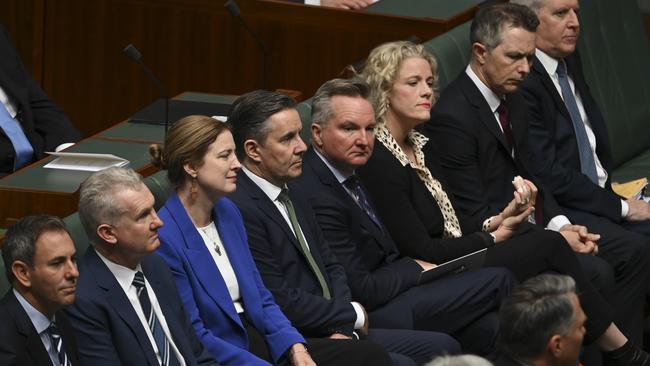
This three-point framework is borrowed from Tony Blair’s dictum for re-election: “A lot done, a lot to do and a lot to lose.” But does Labor have a strong enough record to campaign on? Does it have an animating agenda for another term? And can it secure re-election with its primary vote in long-term decline and its voting coalition fraying at the edges?
It is not a good time to be an incumbent government seeking re-election. The cost-of-living crisis, with voters paying higher prices for everyday goods and services plus increased mortgage payments and rent payments, has made voters cranky and eager to punish governments.
Almost every leader in a democratic country is unpopular, including Albanese. It frustrates ministers, backbenchers and party strategists that polling shows voters struggle to name anything the government has done.
A poll last month showed just 24 per cent of voters could name a single policy decision that has positively changed their lives. Of that minority of voters who could name something, most identified the revamped stage three income tax cuts or electricity rebate.
Labor also wants credit for delivering cheaper medicines and childcare, boosting bulk-billing GP services, providing fee-free TAFE for students, strengthening the bargaining power of unions and wage increases for low-paid workers. But little of this is cutting through, with most voters not feeling any significant change to their cost and quality of living since May 2022.

Last year was dominated by the referendum to enshrine in the Constitution an Indigenous voice to parliament. Voters saw a government not focused on their needs and concerns, and many thought the referendum was given too high a priority for a government in its first term.
The defeat of the referendum underscored the view that the government had the wrong priority.
Albanese leads a conventional cabinet government. The public policy process is orderly, respecting the public service and welcoming different views. The party remains publicly united, MPs are respected and there is no overt leadership jockeying.
But what will secure re-election is what the government has achieved, what it plans to do, and the contrast with the opposition.
When Labor came to power, it did so with the lowest primary vote in 90 years. No Labor government had ever been elected with a primary vote as low as 32.6 per cent. Labor needed to boost this support over the term. But most polls show it has lost support.
The trouble for Labor is that its coalition of voters – blue-collar, school-educated, low-income voters in the suburbs and regions coupled with professional, tertiary-educated, high-income voters in the inner cities – is crumbling. I’ve long written about party dealignment, as working-class voters shift to the Coalition and higher-educated, wealthy voters shift to Labor. This represents a fundamental change for both major parties.
Former minister Kim Carr writes about the structural difficulties in Labor’s vote in his memoir, A Long March, released this week. He writes that Labor has “lost touch” with its historic blue-collar support base as it embraces post-materialist issues and fashionable causes to win over a new elite voting cohort.
“The Labor ship has struck the rock of identity politics, with too many of its spokespeople adopting a censorious tone to those who fail to embrace their particular social policy agendas,” Carr writes.
“Handing over greater influence to those who are doing well and appear oblivious to, or even possibly dismissive of, the struggles of those who are, in the overused contemporary parlance, ‘doing it tough’ a long way from the well-serviced environment of the inner city, is political poison.”
The risk for Labor is that in trying to balance different constituencies, it loses low-income voters to the Coalition or far-right parties, such as One Nation, and also higher-income voters to the far-left Greens and independents – squeezed at both ends of the political spectrum. The challenge, therefore, is to develop a coherent and compelling narrative that appeals to a broad rather than narrow set of voters.
I’ve noted before that Labor has an agenda that seeks to transform Australia with bigger spending, more regulation and intervention in the capital, product and labour markets. But it needs to show voters how this improves their lives and is underpinned by values and principles in policymaking that have wide appeal. It needs to be bolder and more focused on delivery to get voter attention.

“Without an active agenda and an ongoing policy formulation process, a government can find itself waiting for discontent to sweep it away, just as its predecessor did,” Carr argues.
“For the Labor Party, however, the small-target play is an especially dangerous course, because when voters start to cast around for an alternative some will consider switching to a third party.”
While state elections do not always have predictive powers for federal elections, the Liberal National Party’s victory in the Queensland election is further evidence of the drift in support from working-class voters in the outer suburbs and regions away from Labor.
It also showed how Labor held seats with higher-income, better-educated, aspirational voters in and around Brisbane.
Albanese should not put too much hope in persuading voters that Dutton is a danger to their livelihoods. The Opposition Leader has often been underestimated.
Labor needs to work on convincing voters why it deserves re-election and developing an agenda for a second term. Otherwise, it is likely to be forming only the third minority government in a century or, perhaps, lose power altogether.







Anthony Albanese told the Labor caucus at its last meeting that to ensure victory at the next election – most likely mid-May 2025 – the government would have to campaign on its record, explain to voters what it plans to do in a second term, and expose the dangers in electing a Peter Dutton-led Coalition.